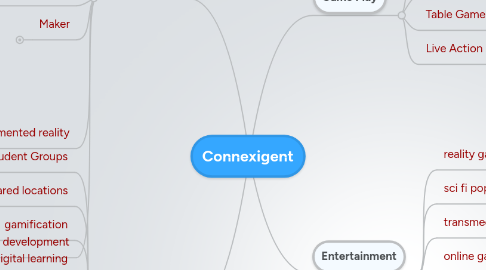
1. Education
1.1. Student Groups
1.1.1. learning styles
1.1.2. level hierarcy
1.1.3. real time status sharing
1.1.4. interest sharing
1.2. central shared locations
1.2.1. campus
1.2.2. libraries
1.2.3. convention center
1.2.4. networks/LANS
1.3. gamification
1.3.1. teaching through fun
1.3.2. badges/rewards
1.3.3. leader board
1.3.4. solving problems
1.3.5. onboarding
1.3.6. narrative
1.4. digital learning
1.4.1. online self-paced
1.4.1.1. Codeacademy
1.4.1.2. Kahn Academy
1.4.1.2.1. stats
1.4.1.2.2. knowledge map
1.4.1.2.3. ka-lite: offline
1.4.2. Edutainment
1.4.2.1. Quest to Learn
1.4.2.2. Institue of Play
1.4.2.3. Gamestar Mechanic
1.4.3. events/camps
1.4.3.1. SparkEd
1.4.3.2. Duke Tip
1.4.4. MOOC
1.4.4.1. connectivism
1.4.4.2. streams
1.5. social initiatives
1.5.1. rhok
1.5.2. Untitled
1.6. Entrepreneurship
1.7. Maker Movement
1.7.1. Maker Faires
1.7.2. Hackathons
1.8. Hybrid Pedagogy
1.8.1. dynamic complexity
1.8.1.1. lessons become harder over time
1.8.1.2. occasional re-leveling
1.8.2. connected learning
1.8.3. Instructional scaffolding
1.8.3.1. teaching by mentoring
1.8.3.2. paring model
1.8.4. agency
1.9. Scientific Method
1.9.1. deductive
1.9.2. lateral thinking
1.9.3. inductive
1.10. STEM
1.10.1. engineering
1.10.2. computer science
2. Technology
2.1. social media
2.1.1. crowd
2.1.1.1. crowdsourcing
2.1.1.2. crowdfunding
2.1.2. short message
2.1.2.1. sms
2.1.2.2. twitter
2.1.3. real time sharing
2.1.3.1. facebook
2.1.3.1.1. status
2.1.3.1.2. friend graph
2.1.3.2. foursquare
2.1.3.2.1. location sharing
2.1.3.2.2. "mayorship"
2.1.4. media sharing
2.1.4.1. pics
2.1.4.2. video
2.1.4.3. wiki
2.1.4.4. podcasts
2.1.4.5. walkthroughs
2.2. IT skills
2.2.1. operating systems
2.2.1.1. linux
2.2.1.1.1. raspian
2.2.1.2. windows
2.2.1.3. android
2.2.2. file exchange
2.2.2.1. sd cards
2.2.2.2. deaddrop
2.2.2.3. file sharing
2.2.3. web/media servers
2.3. Networking
2.3.1. TCP/IP
2.3.2. wifi
2.3.3. LAN
2.3.4. ssh
2.3.5. cloud
2.4. mobile
2.4.1. smart phone
2.4.1.1. iOS
2.4.1.2. android
2.4.2. mobile client
2.5. Geo-location
2.5.1. GIS
2.5.2. RTLS
2.5.3. bluetooth
2.5.4. RFid
2.6. Tracking
2.6.1. RFid
2.6.2. QR codes
2.7. Security
2.7.1. cryptography
2.7.2. privacy
2.7.3. steganography
2.7.4. hacking
2.8. visualization
2.9. internet of things
2.9.1. microcontrollers
2.9.1.1. arduino
2.9.1.2. raspberry pi
2.9.1.3. beaglebone
2.9.1.4. udoo
2.9.2. devices
2.9.2.1. sensors
2.9.2.2. actuators
2.9.2.3. shields
2.9.2.4. electric imp
2.9.3. platforms
2.9.3.1. cosm
2.9.3.2. tinkerforge
2.10. Maker
2.10.1. electronics
2.10.1.1. components
2.10.1.2. soldering
2.10.2. gadgets
2.10.2.1. robotics
2.10.2.1.1. ROS
2.10.2.1.2. LEGO NXT
2.10.2.1.3. immobot
2.10.2.2. 3d printing
2.10.2.3. quadcopter
2.10.2.4. POV
2.11. augmented reality
2.11.1. VR glasses
2.11.2. 3d sensors
2.11.3. gestures
2.11.4. sonification
2.11.5. ambient and invisible
2.12. software development
2.12.1. beginner
2.12.1.1. scratch
2.12.1.2. visual
2.12.2. advanced
2.12.2.1. python
2.12.2.2. web dev
2.12.2.3. LAMP
2.12.3. tools
2.12.3.1. github
2.12.3.2. ide
2.12.3.3. Untitled
2.12.4. methodlolgy
2.12.4.1. Agile
2.12.4.2. skunk works
3. Game Play
3.1. Outdoor Games
3.1.1. Catpure the Flag
3.1.1.1. territorial control
3.1.1.2. teamwork
3.1.1.3. tag, your it
3.1.1.4. time limit
3.1.1.5. mystery (at night)
3.1.2. Scavenger Hunt
3.1.2.1. the hunt
3.1.2.2. gaining items
3.1.2.3. scorint points
3.1.3. self organized
3.1.3.1. spontaneous
3.1.3.2. organizer
3.1.3.3. minmial rule set
3.1.3.4. natural groups
3.2. Location based games
3.2.1. Orienteering
3.2.1.1. navigation
3.2.1.2. control points
3.2.2. Geocaching
3.2.2.1. GPS navigation
3.2.2.2. logbook / caches
3.2.2.3. Whereigo
3.2.2.3.1. Cartridge
3.2.2.3.2. toolkit
3.2.2.4. Munzee
3.2.3. Letterboxing
3.2.3.1. treasure trails
3.2.3.2. puzzles
3.2.4. scvngr.com
3.3. Table Games
3.3.1. self-amending
3.3.1.1. Nomic
3.3.1.2. Imperial Nomic
3.3.1.2.1. game master
3.3.1.2.2. minimal rules set
3.3.1.2.3. points
3.3.1.2.4. occasional reset
3.3.1.3. Mao
3.3.1.3.1. rule dsicovery
3.3.1.3.2. "in the know"
3.3.1.4. Fluxx
3.3.2. inductive logic
3.3.2.1. black box
3.3.2.2. zendo
3.3.2.3. Eleusis
3.3.3. board games
3.3.3.1. risk legacy
3.3.3.1.1. player choices
3.3.3.1.2. permanent rule changes
3.3.3.2. clue
3.3.3.2.1. deductive reasoning
3.3.3.2.2. mystery
3.3.4. party games
3.3.4.1. The Resistance
3.3.4.2. werewolf/mafia
3.4. Live Action Games
3.4.1. Urban Gaming
3.4.1.1. Assassin
3.4.1.1.1. open call
3.4.1.1.2. elimination
3.4.1.1.3. guilds
3.4.1.1.4. safe zone
3.4.1.1.5. hidden targets
3.4.1.1.6. secret identity
3.4.1.2. Humans vs. Zombies
3.4.1.2.1. moderator
3.4.1.2.2. safe zones
3.4.1.2.3. missions
3.4.1.2.4. non-players
3.4.2. Augmented Reality
3.4.2.1. vision based
3.4.2.2. Ingress
3.4.2.2.1. online and mobile
3.4.2.2.2. GPS
3.4.2.2.3. narrative/back story
3.4.2.2.4. non-players: mind units
3.4.2.2.5. hacking
3.4.3. Encounter
3.4.3.1. task managment
3.4.3.2. missions
3.4.3.3. points
3.4.3.4. media hunt
4. Entertainment
4.1. reality gameshow
4.1.1. treature hunters
4.1.1.1. hidden artifacts
4.1.1.2. puzzles
4.1.2. the great race
4.1.3. technology
4.1.3.1. robot combat league
4.1.3.2. big brain theory
4.2. sci fi pop culture
4.2.1. Lost
4.2.2. The Matrix
4.2.2.1. "take the pill"
4.2.2.2. dimension overlay
4.3. transmedia
4.3.1. advertising
4.3.2. immersion
4.3.3. digital storytelling
4.4. online gaming
4.4.1. MMOG
4.4.1.1. narrative
4.4.1.2. clans
4.4.1.3. GM
4.4.1.4. levels
4.4.2. virutal world
4.4.2.1. Minecraft
4.4.2.1.1. open world /sandbox
4.4.2.1.2. exploration
4.4.2.1.3. cooperation
4.4.2.1.4. achievement system
4.4.2.1.5. in-game time
4.4.2.1.6. game modes
4.4.2.1.7. servers
4.4.2.2. second life
4.4.2.2.1. avatars
4.4.2.2.2. economy
4.4.2.3. High Fidelity
4.4.3. Alternate Reality Gaming
4.4.3.1. real-time evolvement
4.4.3.2. persona
4.4.3.3. character driven
4.4.3.4. puppet master
4.4.3.5. "this is not a game"
4.4.3.6. clues / hidden info
4.4.3.7. boundary discovery
4.4.3.8. collaboration
4.4.3.9. collective intelligence
4.4.3.10. Examples
4.4.3.10.1. http://www.metacortechs.com/
4.4.3.10.2. black cloud
4.4.3.10.3. The Beast
4.5. mod gaming
4.5.1. hackable games
4.5.1.1. mozilla game_on
4.5.2. modding / jailbreaking
4.6. serious games
4.6.1. Foldit
4.6.1.1. real world problems
4.6.1.2. puzzles
4.6.2. crowdsolving
4.7. Digital/Physical Interactive Games
4.7.1. Sorcers of MK
4.7.1.1. locations througout park
4.7.1.2. visual recognition
4.7.1.3. collectible items (cards)
4.7.2. Magiquest
4.7.2.1. collectible items (wands)
4.7.2.2. interactive elements
